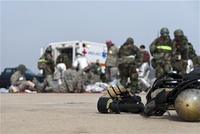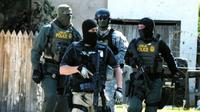-
Guaranteeing communication coverage in the event of disaster
An EU-funded project that aims to develop a rapidly deployable wireless communication network for use in the aftermath of an emergency, disaster, or unexpected event, was commended recently at an international event.
-
-
Teams compete in challenging robotic helicopter competition

A U Michigan student team took part in an autonomous aerial vehicle competition. Their task: build a 3-pound flying machine that can, under its own control, take off, fly through a window into a model building, avoid security lasers, navigate the halls, recognize signs, enter the correct room, find a flash drive in a box on a desk, pick it up, leave a decoy, exit, and land in under ten minutes. Beyond military uses, autonomous vehicle they built could one day be used to survey collapsed buildings or inspect hard-to-get-to parts of bridges and other infrastructure. An offshoot group from a previous U-M team is working to commercialize the U-M technology through a startup called SkySpecs, which inspects windmills.
-
-
Israel, Egypt escalate attacks on militants in Sinai Peninsula (updated)

The growing intelligence cooperation between Egypt and Israel was in evidence early Friday when the Israel Air Force (IAF), in coordination with the Egyptian military, used drone strikes to destroy ready-to-launch rockets and rocket launchers on Egyptian territory, killing five Egyptian militants in the process. The rockets were deployed on Thursday in a desert area near the town of Rafah, and were discovered by an Egyptian surveillance fly-over. On Saturday, the Egyptian air force attacked militant positions in the area, killing twelve Islamists.
-
-
Deteriorating Sinai Peninsula security situation poses problems for Israel, Egypt

The attacks on Islamist targets in northern Sinai — by Israel on Friday and by Egypt on Saturday — are but the latest evidence of a growing problem of militancy and terrorism in the Sinai Peninsula, a vast, hard-to-control, lightly populated area consisting of steep mountain ranges and a forbidding desert. The growing al Qaeda presence in the area, the continuing influence of Iranian arms smuggling networks, and the influx of foreign Jihadists make the deteriorating security situation in the peninsula a threat both to Israel and to Egypt. The stipulations of the 1982 Egypt-Israel peace treaty complicate to fight against the militants.
-
-
FBI allowed informants to commit more than 5,600 crimes in a single year
Newly released documents show that the FBI allowed its informants to break the laws on more than 5,600 occasions in a single year. The Justice Department rules sets tight limits on when informants can engage in what the agency termed “otherwise illegal activity.” Under no circumstances can an agent authorize a violent crime, and the most serious crimes must be approved by federal prosecutors.
-
-
Small modular reactors (SMEs) a “poor bet” to revive U.S. nuclear renaissance: report
A shift to small modular reactors (SMRs) is unlikely to breathe new life into the troubled U.S. nuclear power industry, since SMRs will likely require tens of billions of dollars in federal subsidies or government purchase orders, create new reliability vulnerabilities, as well as concerns in relation to both safety and proliferation, according a report issued last week.
-
-
Israeli drone strike, in coordination with Egypt, destroys militants’ rockets deployed on Egyptian territory
The growing intelligence cooperation between Egypt and Israel was in evidence earlier today (Friday) when the Israel Air Force (IAF), in coordination with the Egyptian military, used drone strikes to destroy ready-to-launch rockets and rocket launchers on Egyptian territory, killing five Egyptian militants in the process. The rockets were deployed on Thursday in a desert area near the town of Rafah, and were discovered by an Egyptian surveillance fly-over.
-
-
Obama administration renews drone campaign in Yemen
Responding to intelligence information about planned terrorist attacks by Al Qaeda in the Arabian Peninsula (AQAP), information which led to the closure of twenty-two U.S. embassies in the Middle East and North Africa and a travel warning issued by the Department of State, the Obama administration has launched a series of drone strikes in Yemen over the past ten days.
-
-
Effective screening of airline passengers arriving from areas of infectious disease outbreaks
New study shows that exit-screening at thirty-six airports would have assessed all air travelers at risk of transporting H1N1 out of Mexico at start of 2009 pandemic. Screening at 99 percent of the world’s international airports could have been forgone with negligible missed opportunities to prevent or delay the spread of disease. Screening at just eight airports worldwide would have led to the assessment of 90 percent of all at-risk air travelers.
-
-
Controlling contagion by restricting mobility
In an epidemic or a bioterrorist attack, the response of government officials could range from a drastic restriction of mobility — imposed isolation or total lockdown of a city — to moderate travel restrictions in some areas or simple suggestions that people remain at home. Deciding to institute any measure would require officials to weigh the costs and benefits of action, but at present there is little data to guide them on the question of how disease spreads through transportation networks. A new MIT study shows that in the face of an epidemic, even moderate government-mandated travel restrictions would slow contagion.
-
-
Navy uses drones for help with radar, communications

Scientists recently launched unmanned aerial vehicles (UAVs) from a research vessel in a significant experiment that could help boost the U.S. Navy’s radar and communications performance at sea.
Sailing off Virginia Beach, Virginia, from 13 to 18 July, the Office of Naval Research’s (ONR) Research Vessel (R/V) Knorr explored ocean and atmospheric weather variations that can change the angle that radar and radio waves bend, making it more difficult for ships to remain undetected and hindering their ability to communicate or locate adversaries.
-
-
Firefighting robot creates 3D images of burning buildings’ interiors for rescuers
Researchers develop novel robotic scouts that can help firefighters to assist in residential and commercial blazes. The robots will map and photograph the interior of burning buildings by using stereo vision. Working together both collaboratively and autonomously, a number of such vehicles would quickly develop an accurate augmented virtual reality picture of the building interior. They would then provide it in near real time to rescuers, who could better assess the structure and plan their firefighting and rescue activities.
-
-
U.S. military trains to support civil authorities during domestic CBRN incident

Vibrant Response 13-2 exercise, conducted by U.S. Northern Command and led by U.S. Army North (Fifth Army), is an annual event and is the country’s largest CBRN exercise. The training exercise is used to evaluate a military unit’s operational and tactical ability to support civil authorities during domestic incidents involving chemical, biological, radiological, or nuclear weapons.
-
-
DEA uses NSA surveillance information to make arrests

The Drug Enforcement Administration (DEA) has benefitted from multiple tips from the National Security Administration’s (NSA) surveillance programs – although not necessarily the programs revealed by Edward Snowden. DEA officials in a secret office known as the Special Operations Division (SOD) are assigned to handle incoming tips from the NSA. The information exchanged between the two agencies includes intelligence intercepts, wiretaps, informants, and a massive database of telephone records.
-
-
The FBI uses hackers’ methods in its surveillance programs
The U.S. government is planning to expand its suspect surveillance programs to include tactics which are commonly used by computer hackers.The FBI typically uses hacking in cases involving organized crime, child pornography, or counterterrorism, a former U.S. official said. The agency is less inclined to use these tools when investigating hackers, out of fear the suspect will discover and publicize the technique.
-
More headlines
The long view
Factories First: Winning the Drone War Before It Starts
Wars are won by factories before they are won on the battlefield,Martin C. Feldmann writes, noting that the United States lacks the manufacturing depth for the coming drone age. Rectifying this situation “will take far more than procurement tweaks,” Feldmann writes. “It demands a national-level, wartime-scale industrial mobilization.”
How Male Grievance Fuels Radicalization and Extremist Violence
By Haily Tran
Social extremism is evolving in reach and form. While traditional racial supremacy ideologies remain, contemporary movements are now often fueled by something more personal and emotionally resonant: male grievance.
The Surprising Reasons Floods and Other Disasters Are Deadlier at Night
By Kate Yoder
It’s not just that it’s dark and people are asleep. Urban sprawl, confirmation bias, and other factors can play a role.
Why Flash Flood Warnings Will Continue to Go Unheeded
By Rebecca Egan McCarthy
Experts say local education and community support are key to conveying risk.
